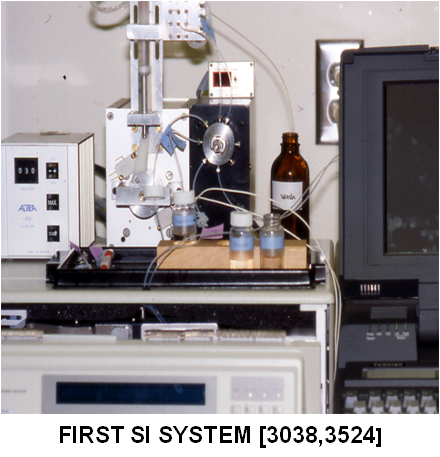Process Control & Sequential Injection
5.1.10.
Mark Gisin, from Ciba-Geigy in Basel, Switzerland, was the first to use FI for process control. He hired our Danish graduate student M. Garn, and went on to apply FI to the monitoring of the fermentation processes. This Ciba-Geigy research group was later joined by M. Widmer who, later with A. Manz, introduced the concept of micro Total Analytical Systems (mTAS). They continued miniaturizing FI and applied it to Bioprocess Control. Incidentally, their work gave me a chance to move to USA, since in 1984, Bruce Kowalski, Jim Callis and Deborah Illman founded the Center for Process Analytical Chemistry (CPAC), at the Department of Chemistry, University of Washington.

CPAC was a brilliant concept that brought together researchers from industry, Academia,
and graduate students. Its purpose was to design, develop, and implement novel tools and concepts for monitoring of the industrial processes. Later, its emphasis changed from the oil and chemical industries to food, biotechnology and pharmaceutical research. Its director, Mel Koch, has broadened academic participation far beyond the University of Washington. Gary Christian arranged for me to give a talk at CPAC, where I was later offered a permanent position. The Chemistry Department and CPAC were, at that time, wonderful places to work, but initially it was difficult for me to thrive in a funding system that was so entirely different from anything I had experienced in Denmark. Now, after 30 years, I believe that the system of proposal writing and research funding in the US, with all its pitfalls, is still the best alternative, but I was less enchanted with it to begin with. It did not help that there were then nearly 3,000 papers published on FIA which was therefore viewed as a “mature” technique, not worth further development and funding. We tried several times, with Gary Christian to get funds from the National Science Foundation for work on FI-AAS and ICP, and we were repeatedly turned down. Sponsors at CPAC were becoming impatient with my work with FI. Understandably, since process engineers did not want peristaltic pumps and manifolds that looked like a tangle of spaghetti. They wanted a reliable system, at least as robust as industrial chromatography. When Graham Marshall, a visiting graduate student from South Africa joined our group, he bravely chose to work on CPAC project. He built a syringe pump that produced a sinusoidal (rather than constant) flow rate. We isolated the pump from the multiposition valve by a holding coil, and provided a proof of concept. The simple flow reversals we used later led to the concept of programmable flow, to Sequential Injection, and ultimately to Bead Injection. Dave Veltkamp wrote the first SI control software (in C+). At CPAC, Don Olson from the Shell Oil Company was the first one to appreciate the potential of SI. He later founded Global FIA, and invited Graham to join his team.









